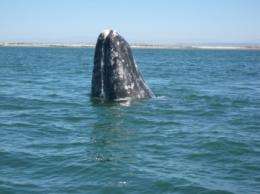Hungry grey whales face a ‘prey crisis’, scientists warn

(PhysOrg.com) -- Scientists from the University of Bath have reported a dramatic fall in the number of grey whale sightings in British Columbia and are investigating the reasons for the disappearance of one of their main sources of prey.
The researchers, supported by international environmental charity Earthwatch, are studying grey whales in their summer feeding grounds off the west coast of Vancouver Island and the central coast of British Columbia to design better ways to protect them and determine whether populations are being affected by climate change.
In 2004, the scientists spotted almost 100 whales on the southern central coast. This number fell dramatically to a low of just three in 2009.
The story is similar off the west coast of Vancouver Island, where the numbers of whales have shown an oscillating, but decreasing trend in the last six years.
So far this year there have been few sightings of whales. Earthwatch scientist Dr William Megill, a lecturer in the Ocean Technologies Laboratory at the University of Bath, says his colleagues in Mexico, where the whales breed, are continuing to see large numbers of thin and hungry whales.
Indications are that the whales’ requirements are exceeding the available prey resources in their feeding grounds off Alaska, British Columbia and the Pacific Northwest.
Three years ago Dr Megill warned that grey whales arriving malnourished in their breeding grounds off the Mexican coast may have represented an early indication of environmental changes in the Pacific.
In 2009, Dr Megill and his team found that the tiny crustaceans they feed on, known as ‘mysids’, had disappeared from Clayoquot Sound, forcing the whales to feed offshore, sifting through sand and mud for other prey such as amphipods (small shrimp) and worms.
Although it is obvious the whales have consumed the mysids, why the mysids are not returning is a more serious question.
Dr Megill said: “Our survey of the northern west coast failed to identify any other summer grey whale hotspots, so it sounds like the ‘mysid crisis’ may be more serious than we first thought.
“Only a small number of greys stayed for the summer, and it was quickly evident why - the usually highly abundant mysid crop failed this year, and so the whales were forced to look elsewhere, or to switch prey.
“We completed a survey of the whole of the northern west coast of Vancouver Island and the southern Central Coast, and didn’t find any pockets of whales, so we conclude that they must have continued up into northern British Columbia at least, or more likely into Alaskan waters.
“Our colleagues in Mexico are seeing increasing numbers of ‘skinny’ whales, and there were several strandings this spring in Washington and British Columbia. It’s fairly obvious that these animals are pushing their food resource to the limit, and some aren’t going to make it.
“They’re pretty resilient, but if food stocks don’t recover, or the whales can’t find sufficient other resources, then we’re going to start losing whales. I don’t think we’re in any danger of losing the grey whale, but it is nonetheless an issue of some significant concern.”
The team is monitoring the situation and this year their research is focussing on looking for whales in unusual places. They are also diversifying their prey studies to include other species the whales may be eating, and continuing to study the mysids in the laboratory to analyse the conditions in which they thrive.
Dr Megill added: “The big message is that we still need to understand what’s driving the ecosystem. If it’s just the whales overharvesting, then fine, nature will handle it.
“But if it’s more complicated than that, and there’s some kind of anthropogenic driver involved, whether it’s climate change, ocean acidification, habitat degradation, or something else, then it’s our responsibility to work out what’s going on, and see about setting things straight.
“The likelihood is that the ‘setting things straight’ will go way beyond grey whales and mysids, and our story will be one more call for mankind to get a grip on his consumption in order to deal with the global consequences.”
Provided by University of Bath















